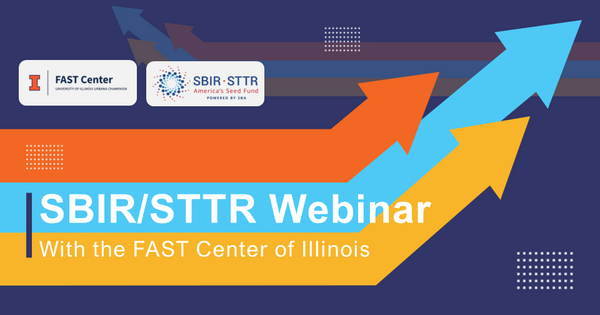
- Sponsor
- Illinois FAST Center
- Registration
- Registration Required
- Contact
- Cheri Soliday
- csoliday@illinois.edu
- Views
- 128
- Originating Calendar
- FAST Center of Illinois Calendar
Join our team of SBIR experts and the FAST (Federal and State Technology) Center of Illinois for an SBIR/STTR webinar event from 1:00-2:00pm on Tuesday, January 30.
This workshop will provide an understanding of the primary purpose of TABA funds, the allowable uses of TABA funding, a review of various TABA policies from several SBIR/STTR agencies, how to find potential TABA providers, the requirements of providers at time of submission, and examples of TABA integration.
Our presenter will be Kristen (Kris) Parmelee of the Parmelee Consulting Group, Inc., a member of the Illinois FAST Center consultant team. Kris is a proud graduate of Indiana University’s School of Public and Environmental Affairs (SPEA). She started her career at an Indianapolis-based nonprofit in program development and management. After gaining initial experience in fund raising, Kris launched her own venture in 2000 with a focus on private foundation and federal grants. In 2005, she expanded her experience to include SBIR/STTR and for the past five years, has focused almost exclusively on SBIR/STTR and project management services.
After the presentation, teams will have the opportunity to ask questions from the FAST team. Office Hours are also available by signing up online.
This is a free, virtual event, but registration is required. The link to the webinar will be emailed to you upon completion of your registration. Recording Notice: By registering for this webinar, you acknowledge and agree that it will be recorded and shared online for public viewing.
For more information and how to access more resources, visit the FAST Center at Illinois website.
The Small Business Innovation Research (SBIR) and Small Business Technology Transfer (STTR) programs are highly competitive programs that encourage domestic small businesses to engage in Federal Research/Research and Development (R/R&D) with the potential for commercialization. Through a competitive awards-based program, SBIR and STTR enable small businesses to explore their technological potential and provide the incentive to profit from its commercialization. By including qualified small businesses in the nation's R&D arena, high-tech innovation is stimulated, and the United States gains entrepreneurial spirit as it meets its specific research and development needs.
